Food Operations Management Report: Responsibilities and Analysis
VerifiedAdded on 2020/10/22
|9
|2457
|417
Report
AI Summary
This report provides a comprehensive overview of food operations management within the context of the Imperial Hotel in London. It begins by defining the responsibilities of a facilities manager, including staff engagement, HR roles, and legal issues. The report then delves into the operational aspects of the building, such as accessibility, maintenance, and security. It also explores the manager's responsibilities towards customers, emphasizing the importance of identifying customer needs, delivering good service, and ensuring customer satisfaction. Furthermore, the report examines the impact of employers and funding agencies on facilities operations, differentiating between public and private sectors. Finally, the report addresses the evaluation and review procedures used to analyze the quality and effectiveness of facilities operations, concluding that effective monitoring and evaluation are crucial for continuous improvement. The report leverages the content from provided PPT to cover all the aspects of the assignment brief.
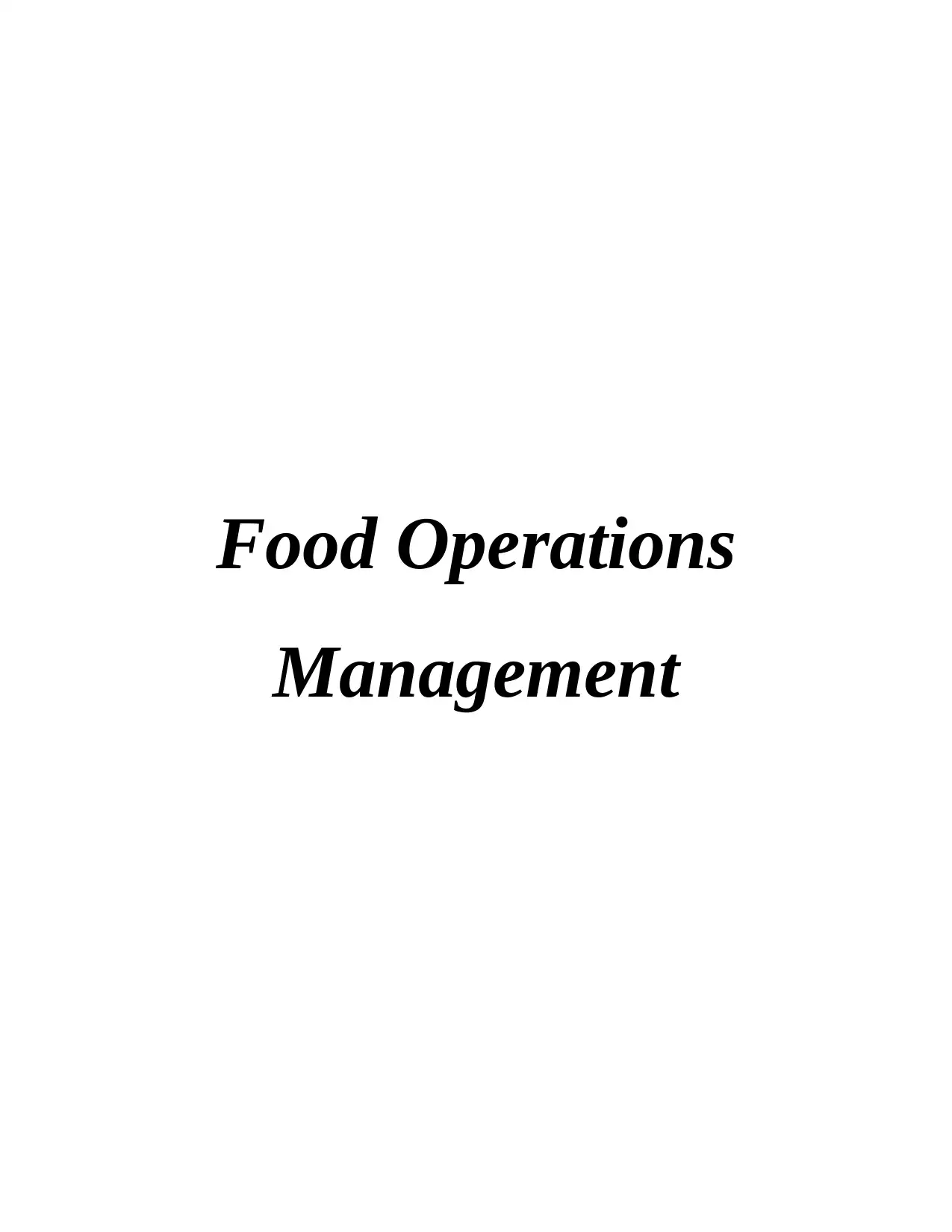
Food Operations
Management
Management
Paraphrase This Document
Need a fresh take? Get an instant paraphrase of this document with our AI Paraphraser
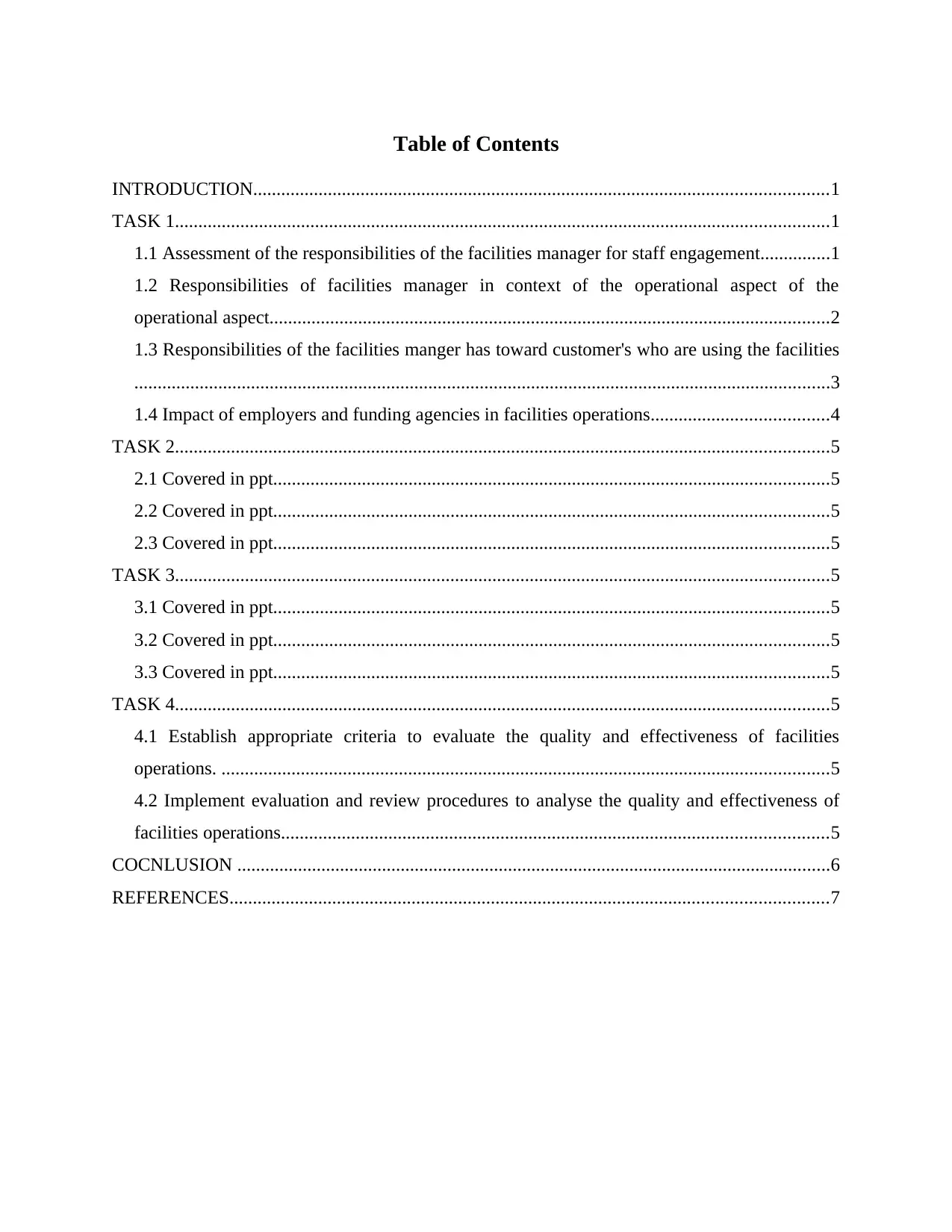
Table of Contents
INTRODUCTION...........................................................................................................................1
TASK 1............................................................................................................................................1
1.1 Assessment of the responsibilities of the facilities manager for staff engagement...............1
1.2 Responsibilities of facilities manager in context of the operational aspect of the
operational aspect........................................................................................................................2
1.3 Responsibilities of the facilities manger has toward customer's who are using the facilities
.....................................................................................................................................................3
1.4 Impact of employers and funding agencies in facilities operations......................................4
TASK 2............................................................................................................................................5
2.1 Covered in ppt.......................................................................................................................5
2.2 Covered in ppt.......................................................................................................................5
2.3 Covered in ppt.......................................................................................................................5
TASK 3............................................................................................................................................5
3.1 Covered in ppt.......................................................................................................................5
3.2 Covered in ppt.......................................................................................................................5
3.3 Covered in ppt.......................................................................................................................5
TASK 4............................................................................................................................................5
4.1 Establish appropriate criteria to evaluate the quality and effectiveness of facilities
operations. ..................................................................................................................................5
4.2 Implement evaluation and review procedures to analyse the quality and effectiveness of
facilities operations.....................................................................................................................5
COCNLUSION ...............................................................................................................................6
REFERENCES................................................................................................................................7
INTRODUCTION...........................................................................................................................1
TASK 1............................................................................................................................................1
1.1 Assessment of the responsibilities of the facilities manager for staff engagement...............1
1.2 Responsibilities of facilities manager in context of the operational aspect of the
operational aspect........................................................................................................................2
1.3 Responsibilities of the facilities manger has toward customer's who are using the facilities
.....................................................................................................................................................3
1.4 Impact of employers and funding agencies in facilities operations......................................4
TASK 2............................................................................................................................................5
2.1 Covered in ppt.......................................................................................................................5
2.2 Covered in ppt.......................................................................................................................5
2.3 Covered in ppt.......................................................................................................................5
TASK 3............................................................................................................................................5
3.1 Covered in ppt.......................................................................................................................5
3.2 Covered in ppt.......................................................................................................................5
3.3 Covered in ppt.......................................................................................................................5
TASK 4............................................................................................................................................5
4.1 Establish appropriate criteria to evaluate the quality and effectiveness of facilities
operations. ..................................................................................................................................5
4.2 Implement evaluation and review procedures to analyse the quality and effectiveness of
facilities operations.....................................................................................................................5
COCNLUSION ...............................................................................................................................6
REFERENCES................................................................................................................................7
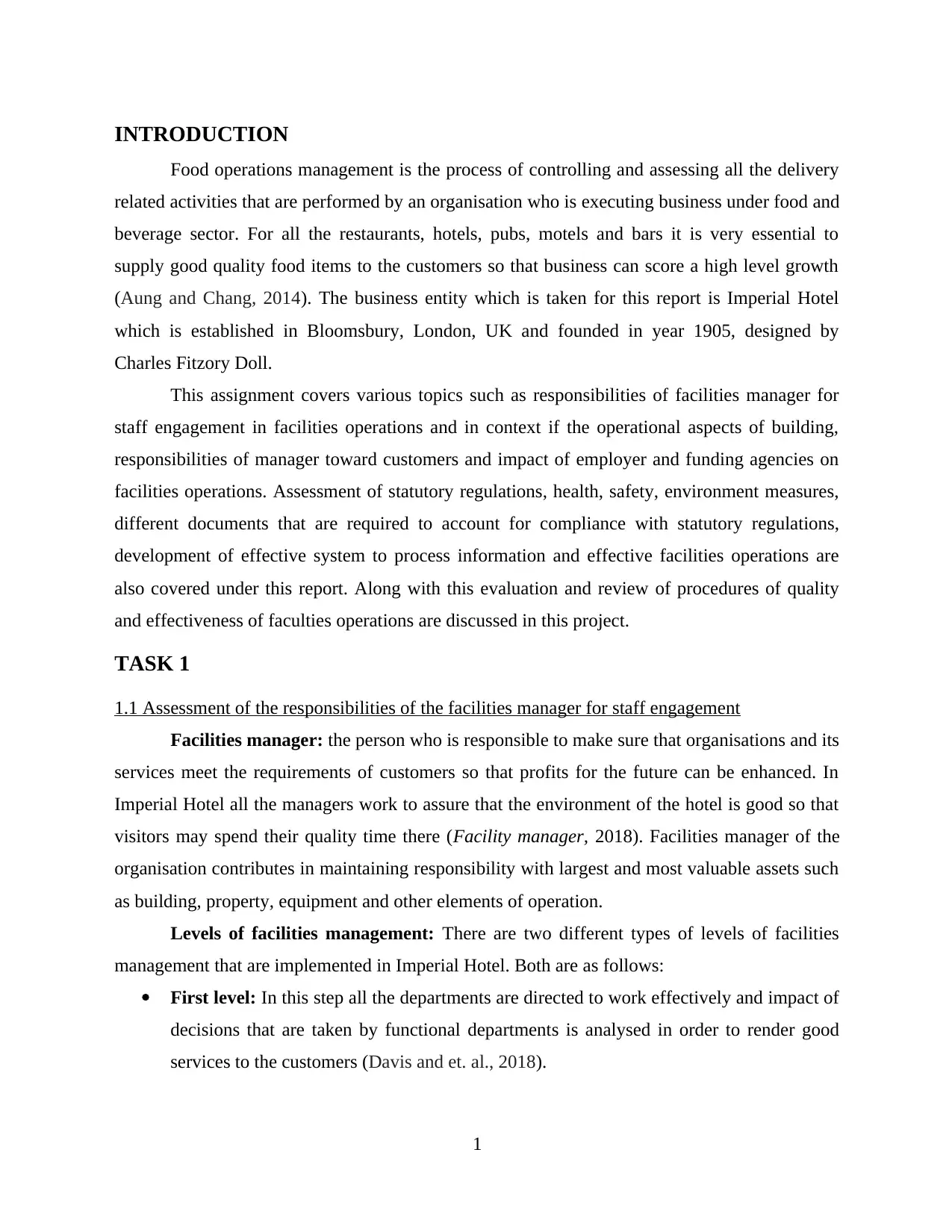
INTRODUCTION
Food operations management is the process of controlling and assessing all the delivery
related activities that are performed by an organisation who is executing business under food and
beverage sector. For all the restaurants, hotels, pubs, motels and bars it is very essential to
supply good quality food items to the customers so that business can score a high level growth
(Aung and Chang, 2014). The business entity which is taken for this report is Imperial Hotel
which is established in Bloomsbury, London, UK and founded in year 1905, designed by
Charles Fitzory Doll.
This assignment covers various topics such as responsibilities of facilities manager for
staff engagement in facilities operations and in context if the operational aspects of building,
responsibilities of manager toward customers and impact of employer and funding agencies on
facilities operations. Assessment of statutory regulations, health, safety, environment measures,
different documents that are required to account for compliance with statutory regulations,
development of effective system to process information and effective facilities operations are
also covered under this report. Along with this evaluation and review of procedures of quality
and effectiveness of faculties operations are discussed in this project.
TASK 1
1.1 Assessment of the responsibilities of the facilities manager for staff engagement
Facilities manager: the person who is responsible to make sure that organisations and its
services meet the requirements of customers so that profits for the future can be enhanced. In
Imperial Hotel all the managers work to assure that the environment of the hotel is good so that
visitors may spend their quality time there (Facility manager, 2018). Facilities manager of the
organisation contributes in maintaining responsibility with largest and most valuable assets such
as building, property, equipment and other elements of operation.
Levels of facilities management: There are two different types of levels of facilities
management that are implemented in Imperial Hotel. Both are as follows:
First level: In this step all the departments are directed to work effectively and impact of
decisions that are taken by functional departments is analysed in order to render good
services to the customers (Davis and et. al., 2018).
1
Food operations management is the process of controlling and assessing all the delivery
related activities that are performed by an organisation who is executing business under food and
beverage sector. For all the restaurants, hotels, pubs, motels and bars it is very essential to
supply good quality food items to the customers so that business can score a high level growth
(Aung and Chang, 2014). The business entity which is taken for this report is Imperial Hotel
which is established in Bloomsbury, London, UK and founded in year 1905, designed by
Charles Fitzory Doll.
This assignment covers various topics such as responsibilities of facilities manager for
staff engagement in facilities operations and in context if the operational aspects of building,
responsibilities of manager toward customers and impact of employer and funding agencies on
facilities operations. Assessment of statutory regulations, health, safety, environment measures,
different documents that are required to account for compliance with statutory regulations,
development of effective system to process information and effective facilities operations are
also covered under this report. Along with this evaluation and review of procedures of quality
and effectiveness of faculties operations are discussed in this project.
TASK 1
1.1 Assessment of the responsibilities of the facilities manager for staff engagement
Facilities manager: the person who is responsible to make sure that organisations and its
services meet the requirements of customers so that profits for the future can be enhanced. In
Imperial Hotel all the managers work to assure that the environment of the hotel is good so that
visitors may spend their quality time there (Facility manager, 2018). Facilities manager of the
organisation contributes in maintaining responsibility with largest and most valuable assets such
as building, property, equipment and other elements of operation.
Levels of facilities management: There are two different types of levels of facilities
management that are implemented in Imperial Hotel. Both are as follows:
First level: In this step all the departments are directed to work effectively and impact of
decisions that are taken by functional departments is analysed in order to render good
services to the customers (Davis and et. al., 2018).
1
⊘ This is a preview!⊘
Do you want full access?
Subscribe today to unlock all pages.

Trusted by 1+ million students worldwide
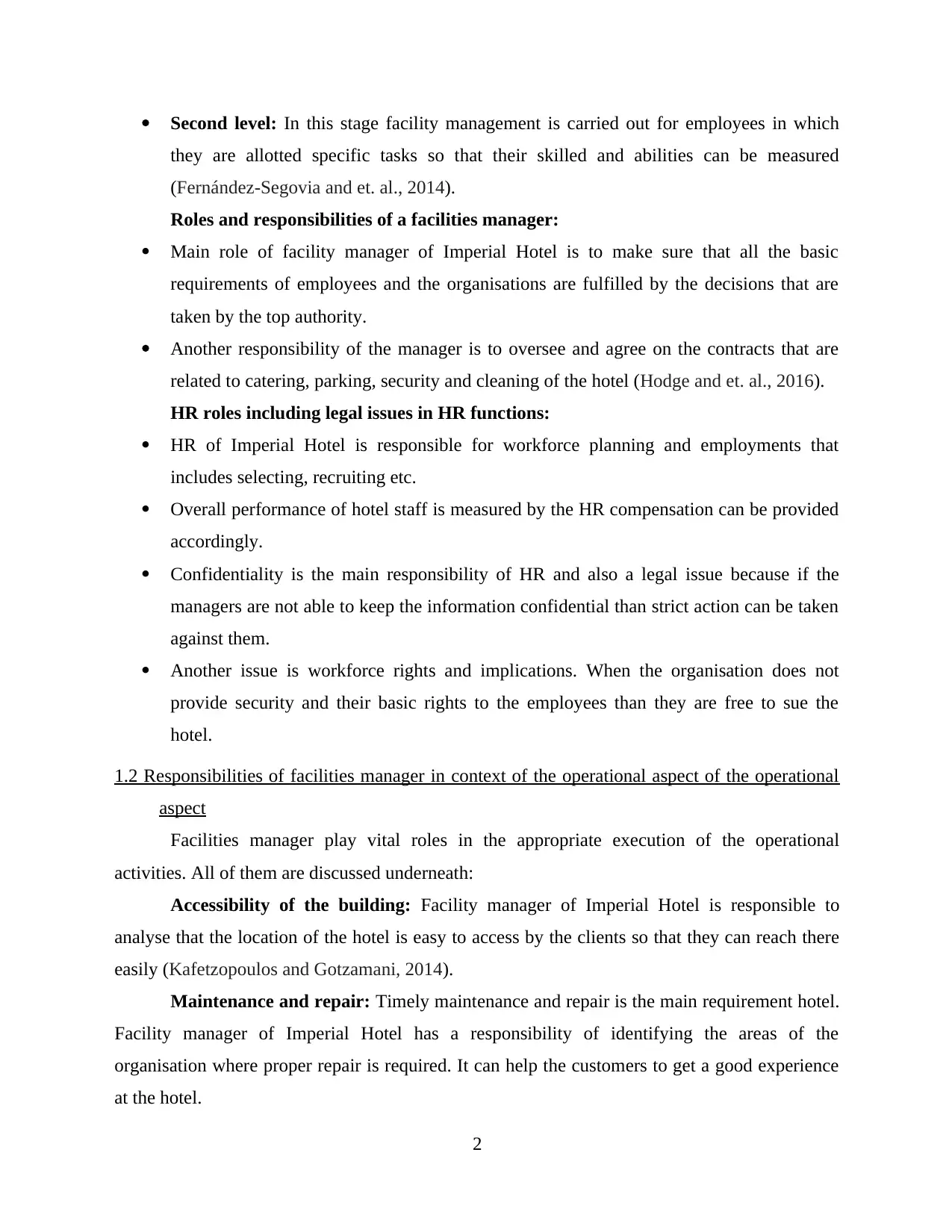
Second level: In this stage facility management is carried out for employees in which
they are allotted specific tasks so that their skilled and abilities can be measured
(Fernández-Segovia and et. al., 2014).
Roles and responsibilities of a facilities manager:
Main role of facility manager of Imperial Hotel is to make sure that all the basic
requirements of employees and the organisations are fulfilled by the decisions that are
taken by the top authority.
Another responsibility of the manager is to oversee and agree on the contracts that are
related to catering, parking, security and cleaning of the hotel (Hodge and et. al., 2016).
HR roles including legal issues in HR functions:
HR of Imperial Hotel is responsible for workforce planning and employments that
includes selecting, recruiting etc.
Overall performance of hotel staff is measured by the HR compensation can be provided
accordingly.
Confidentiality is the main responsibility of HR and also a legal issue because if the
managers are not able to keep the information confidential than strict action can be taken
against them.
Another issue is workforce rights and implications. When the organisation does not
provide security and their basic rights to the employees than they are free to sue the
hotel.
1.2 Responsibilities of facilities manager in context of the operational aspect of the operational
aspect
Facilities manager play vital roles in the appropriate execution of the operational
activities. All of them are discussed underneath:
Accessibility of the building: Facility manager of Imperial Hotel is responsible to
analyse that the location of the hotel is easy to access by the clients so that they can reach there
easily (Kafetzopoulos and Gotzamani, 2014).
Maintenance and repair: Timely maintenance and repair is the main requirement hotel.
Facility manager of Imperial Hotel has a responsibility of identifying the areas of the
organisation where proper repair is required. It can help the customers to get a good experience
at the hotel.
2
they are allotted specific tasks so that their skilled and abilities can be measured
(Fernández-Segovia and et. al., 2014).
Roles and responsibilities of a facilities manager:
Main role of facility manager of Imperial Hotel is to make sure that all the basic
requirements of employees and the organisations are fulfilled by the decisions that are
taken by the top authority.
Another responsibility of the manager is to oversee and agree on the contracts that are
related to catering, parking, security and cleaning of the hotel (Hodge and et. al., 2016).
HR roles including legal issues in HR functions:
HR of Imperial Hotel is responsible for workforce planning and employments that
includes selecting, recruiting etc.
Overall performance of hotel staff is measured by the HR compensation can be provided
accordingly.
Confidentiality is the main responsibility of HR and also a legal issue because if the
managers are not able to keep the information confidential than strict action can be taken
against them.
Another issue is workforce rights and implications. When the organisation does not
provide security and their basic rights to the employees than they are free to sue the
hotel.
1.2 Responsibilities of facilities manager in context of the operational aspect of the operational
aspect
Facilities manager play vital roles in the appropriate execution of the operational
activities. All of them are discussed underneath:
Accessibility of the building: Facility manager of Imperial Hotel is responsible to
analyse that the location of the hotel is easy to access by the clients so that they can reach there
easily (Kafetzopoulos and Gotzamani, 2014).
Maintenance and repair: Timely maintenance and repair is the main requirement hotel.
Facility manager of Imperial Hotel has a responsibility of identifying the areas of the
organisation where proper repair is required. It can help the customers to get a good experience
at the hotel.
2
Paraphrase This Document
Need a fresh take? Get an instant paraphrase of this document with our AI Paraphraser
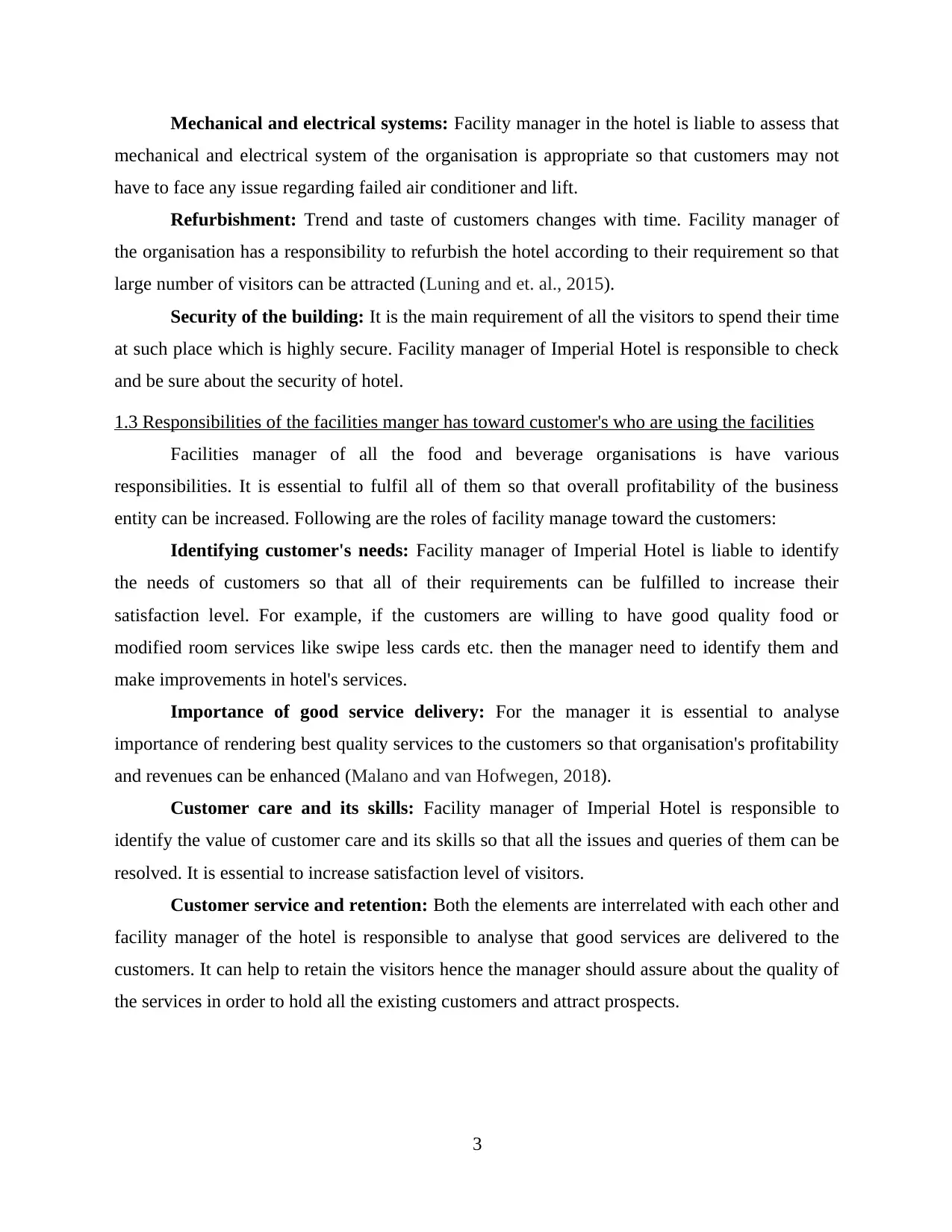
Mechanical and electrical systems: Facility manager in the hotel is liable to assess that
mechanical and electrical system of the organisation is appropriate so that customers may not
have to face any issue regarding failed air conditioner and lift.
Refurbishment: Trend and taste of customers changes with time. Facility manager of
the organisation has a responsibility to refurbish the hotel according to their requirement so that
large number of visitors can be attracted (Luning and et. al., 2015).
Security of the building: It is the main requirement of all the visitors to spend their time
at such place which is highly secure. Facility manager of Imperial Hotel is responsible to check
and be sure about the security of hotel.
1.3 Responsibilities of the facilities manger has toward customer's who are using the facilities
Facilities manager of all the food and beverage organisations is have various
responsibilities. It is essential to fulfil all of them so that overall profitability of the business
entity can be increased. Following are the roles of facility manage toward the customers:
Identifying customer's needs: Facility manager of Imperial Hotel is liable to identify
the needs of customers so that all of their requirements can be fulfilled to increase their
satisfaction level. For example, if the customers are willing to have good quality food or
modified room services like swipe less cards etc. then the manager need to identify them and
make improvements in hotel's services.
Importance of good service delivery: For the manager it is essential to analyse
importance of rendering best quality services to the customers so that organisation's profitability
and revenues can be enhanced (Malano and van Hofwegen, 2018).
Customer care and its skills: Facility manager of Imperial Hotel is responsible to
identify the value of customer care and its skills so that all the issues and queries of them can be
resolved. It is essential to increase satisfaction level of visitors.
Customer service and retention: Both the elements are interrelated with each other and
facility manager of the hotel is responsible to analyse that good services are delivered to the
customers. It can help to retain the visitors hence the manager should assure about the quality of
the services in order to hold all the existing customers and attract prospects.
3
mechanical and electrical system of the organisation is appropriate so that customers may not
have to face any issue regarding failed air conditioner and lift.
Refurbishment: Trend and taste of customers changes with time. Facility manager of
the organisation has a responsibility to refurbish the hotel according to their requirement so that
large number of visitors can be attracted (Luning and et. al., 2015).
Security of the building: It is the main requirement of all the visitors to spend their time
at such place which is highly secure. Facility manager of Imperial Hotel is responsible to check
and be sure about the security of hotel.
1.3 Responsibilities of the facilities manger has toward customer's who are using the facilities
Facilities manager of all the food and beverage organisations is have various
responsibilities. It is essential to fulfil all of them so that overall profitability of the business
entity can be increased. Following are the roles of facility manage toward the customers:
Identifying customer's needs: Facility manager of Imperial Hotel is liable to identify
the needs of customers so that all of their requirements can be fulfilled to increase their
satisfaction level. For example, if the customers are willing to have good quality food or
modified room services like swipe less cards etc. then the manager need to identify them and
make improvements in hotel's services.
Importance of good service delivery: For the manager it is essential to analyse
importance of rendering best quality services to the customers so that organisation's profitability
and revenues can be enhanced (Malano and van Hofwegen, 2018).
Customer care and its skills: Facility manager of Imperial Hotel is responsible to
identify the value of customer care and its skills so that all the issues and queries of them can be
resolved. It is essential to increase satisfaction level of visitors.
Customer service and retention: Both the elements are interrelated with each other and
facility manager of the hotel is responsible to analyse that good services are delivered to the
customers. It can help to retain the visitors hence the manager should assure about the quality of
the services in order to hold all the existing customers and attract prospects.
3
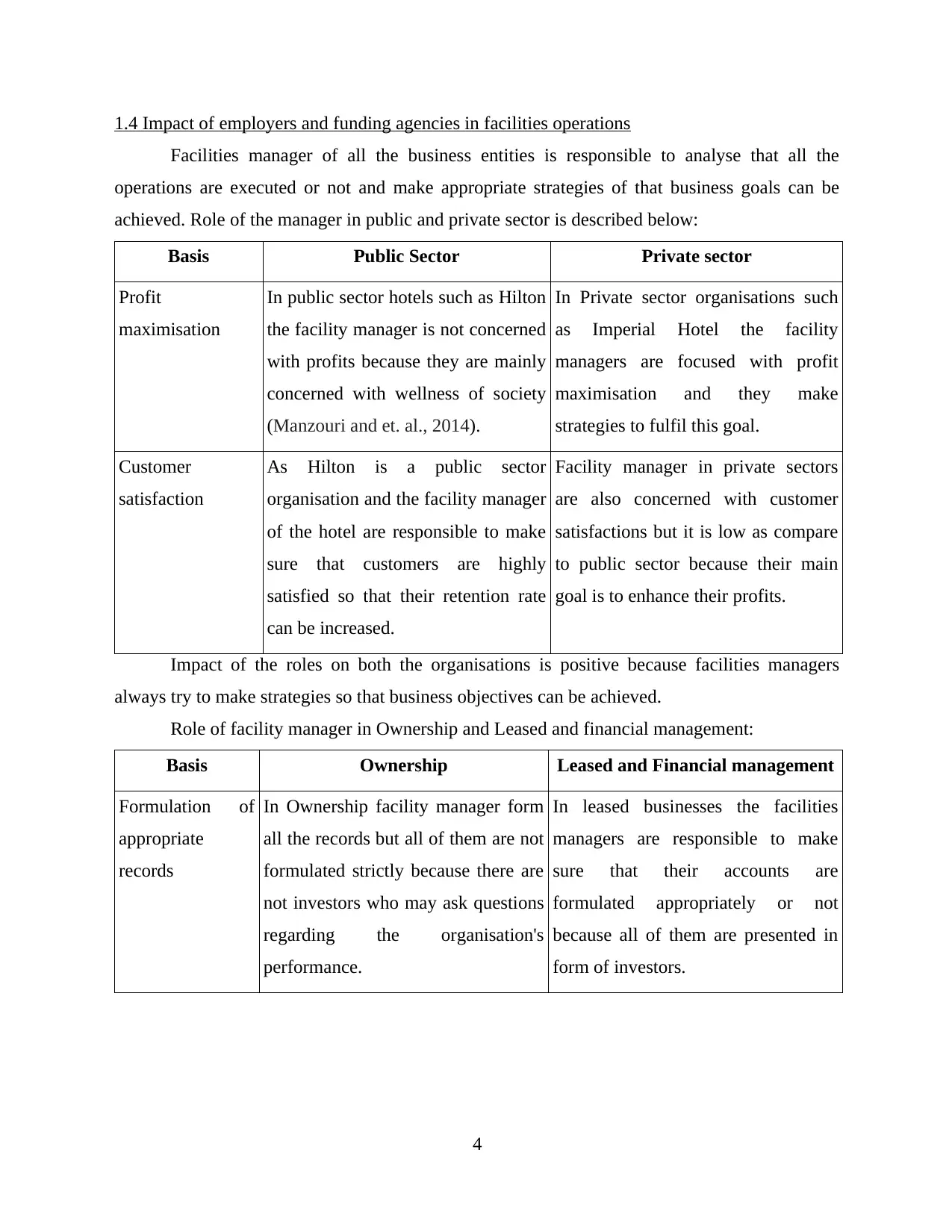
1.4 Impact of employers and funding agencies in facilities operations
Facilities manager of all the business entities is responsible to analyse that all the
operations are executed or not and make appropriate strategies of that business goals can be
achieved. Role of the manager in public and private sector is described below:
Basis Public Sector Private sector
Profit
maximisation
In public sector hotels such as Hilton
the facility manager is not concerned
with profits because they are mainly
concerned with wellness of society
(Manzouri and et. al., 2014).
In Private sector organisations such
as Imperial Hotel the facility
managers are focused with profit
maximisation and they make
strategies to fulfil this goal.
Customer
satisfaction
As Hilton is a public sector
organisation and the facility manager
of the hotel are responsible to make
sure that customers are highly
satisfied so that their retention rate
can be increased.
Facility manager in private sectors
are also concerned with customer
satisfactions but it is low as compare
to public sector because their main
goal is to enhance their profits.
Impact of the roles on both the organisations is positive because facilities managers
always try to make strategies so that business objectives can be achieved.
Role of facility manager in Ownership and Leased and financial management:
Basis Ownership Leased and Financial management
Formulation of
appropriate
records
In Ownership facility manager form
all the records but all of them are not
formulated strictly because there are
not investors who may ask questions
regarding the organisation's
performance.
In leased businesses the facilities
managers are responsible to make
sure that their accounts are
formulated appropriately or not
because all of them are presented in
form of investors.
4
Facilities manager of all the business entities is responsible to analyse that all the
operations are executed or not and make appropriate strategies of that business goals can be
achieved. Role of the manager in public and private sector is described below:
Basis Public Sector Private sector
Profit
maximisation
In public sector hotels such as Hilton
the facility manager is not concerned
with profits because they are mainly
concerned with wellness of society
(Manzouri and et. al., 2014).
In Private sector organisations such
as Imperial Hotel the facility
managers are focused with profit
maximisation and they make
strategies to fulfil this goal.
Customer
satisfaction
As Hilton is a public sector
organisation and the facility manager
of the hotel are responsible to make
sure that customers are highly
satisfied so that their retention rate
can be increased.
Facility manager in private sectors
are also concerned with customer
satisfactions but it is low as compare
to public sector because their main
goal is to enhance their profits.
Impact of the roles on both the organisations is positive because facilities managers
always try to make strategies so that business objectives can be achieved.
Role of facility manager in Ownership and Leased and financial management:
Basis Ownership Leased and Financial management
Formulation of
appropriate
records
In Ownership facility manager form
all the records but all of them are not
formulated strictly because there are
not investors who may ask questions
regarding the organisation's
performance.
In leased businesses the facilities
managers are responsible to make
sure that their accounts are
formulated appropriately or not
because all of them are presented in
form of investors.
4
⊘ This is a preview!⊘
Do you want full access?
Subscribe today to unlock all pages.

Trusted by 1+ million students worldwide
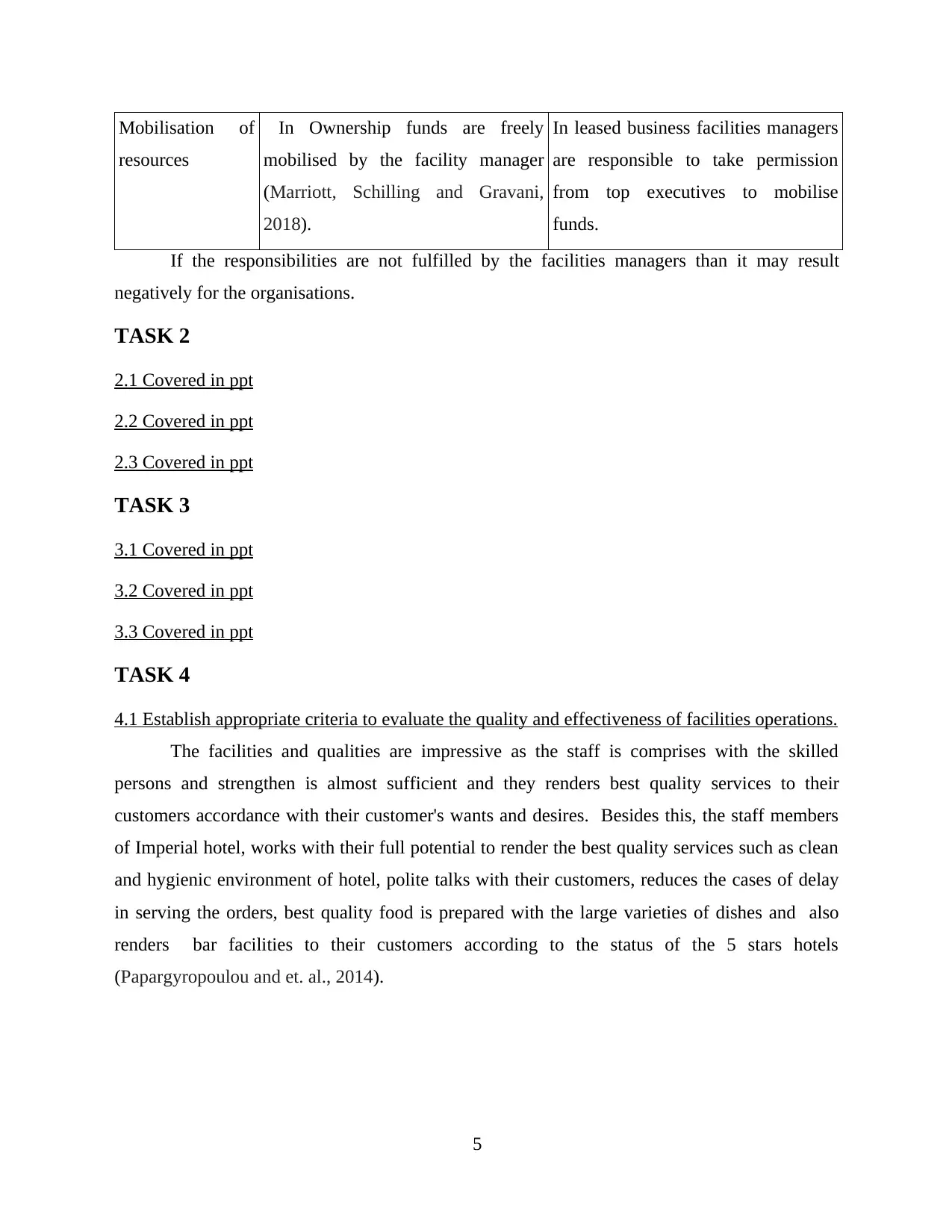
Mobilisation of
resources
In Ownership funds are freely
mobilised by the facility manager
(Marriott, Schilling and Gravani,
2018).
In leased business facilities managers
are responsible to take permission
from top executives to mobilise
funds.
If the responsibilities are not fulfilled by the facilities managers than it may result
negatively for the organisations.
TASK 2
2.1 Covered in ppt
2.2 Covered in ppt
2.3 Covered in ppt
TASK 3
3.1 Covered in ppt
3.2 Covered in ppt
3.3 Covered in ppt
TASK 4
4.1 Establish appropriate criteria to evaluate the quality and effectiveness of facilities operations.
The facilities and qualities are impressive as the staff is comprises with the skilled
persons and strengthen is almost sufficient and they renders best quality services to their
customers accordance with their customer's wants and desires. Besides this, the staff members
of Imperial hotel, works with their full potential to render the best quality services such as clean
and hygienic environment of hotel, polite talks with their customers, reduces the cases of delay
in serving the orders, best quality food is prepared with the large varieties of dishes and also
renders bar facilities to their customers according to the status of the 5 stars hotels
(Papargyropoulou and et. al., 2014).
5
resources
In Ownership funds are freely
mobilised by the facility manager
(Marriott, Schilling and Gravani,
2018).
In leased business facilities managers
are responsible to take permission
from top executives to mobilise
funds.
If the responsibilities are not fulfilled by the facilities managers than it may result
negatively for the organisations.
TASK 2
2.1 Covered in ppt
2.2 Covered in ppt
2.3 Covered in ppt
TASK 3
3.1 Covered in ppt
3.2 Covered in ppt
3.3 Covered in ppt
TASK 4
4.1 Establish appropriate criteria to evaluate the quality and effectiveness of facilities operations.
The facilities and qualities are impressive as the staff is comprises with the skilled
persons and strengthen is almost sufficient and they renders best quality services to their
customers accordance with their customer's wants and desires. Besides this, the staff members
of Imperial hotel, works with their full potential to render the best quality services such as clean
and hygienic environment of hotel, polite talks with their customers, reduces the cases of delay
in serving the orders, best quality food is prepared with the large varieties of dishes and also
renders bar facilities to their customers according to the status of the 5 stars hotels
(Papargyropoulou and et. al., 2014).
5
Paraphrase This Document
Need a fresh take? Get an instant paraphrase of this document with our AI Paraphraser
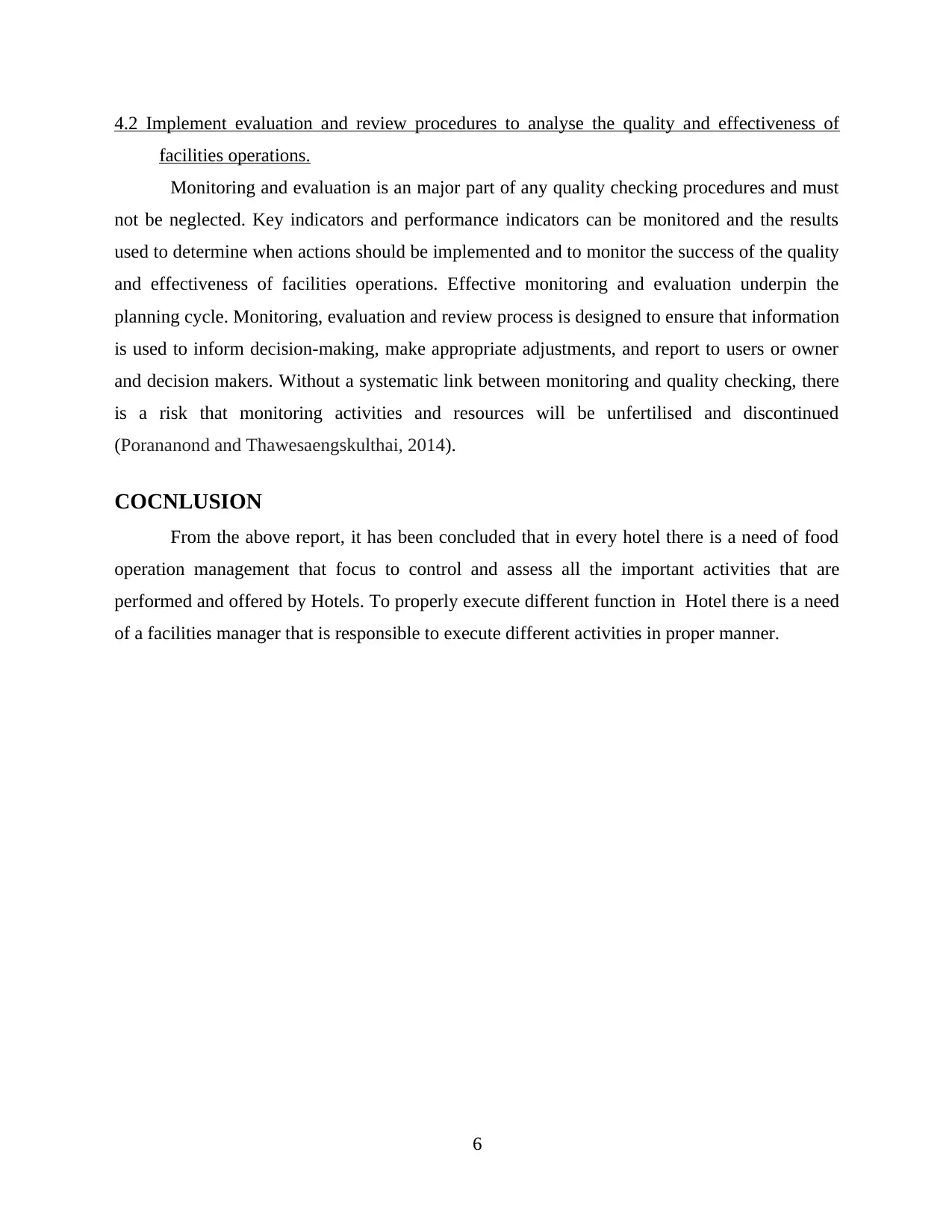
4.2 Implement evaluation and review procedures to analyse the quality and effectiveness of
facilities operations.
Monitoring and evaluation is an major part of any quality checking procedures and must
not be neglected. Key indicators and performance indicators can be monitored and the results
used to determine when actions should be implemented and to monitor the success of the quality
and effectiveness of facilities operations. Effective monitoring and evaluation underpin the
planning cycle. Monitoring, evaluation and review process is designed to ensure that information
is used to inform decision-making, make appropriate adjustments, and report to users or owner
and decision makers. Without a systematic link between monitoring and quality checking, there
is a risk that monitoring activities and resources will be unfertilised and discontinued
(Porananond and Thawesaengskulthai, 2014).
COCNLUSION
From the above report, it has been concluded that in every hotel there is a need of food
operation management that focus to control and assess all the important activities that are
performed and offered by Hotels. To properly execute different function in Hotel there is a need
of a facilities manager that is responsible to execute different activities in proper manner.
6
facilities operations.
Monitoring and evaluation is an major part of any quality checking procedures and must
not be neglected. Key indicators and performance indicators can be monitored and the results
used to determine when actions should be implemented and to monitor the success of the quality
and effectiveness of facilities operations. Effective monitoring and evaluation underpin the
planning cycle. Monitoring, evaluation and review process is designed to ensure that information
is used to inform decision-making, make appropriate adjustments, and report to users or owner
and decision makers. Without a systematic link between monitoring and quality checking, there
is a risk that monitoring activities and resources will be unfertilised and discontinued
(Porananond and Thawesaengskulthai, 2014).
COCNLUSION
From the above report, it has been concluded that in every hotel there is a need of food
operation management that focus to control and assess all the important activities that are
performed and offered by Hotels. To properly execute different function in Hotel there is a need
of a facilities manager that is responsible to execute different activities in proper manner.
6
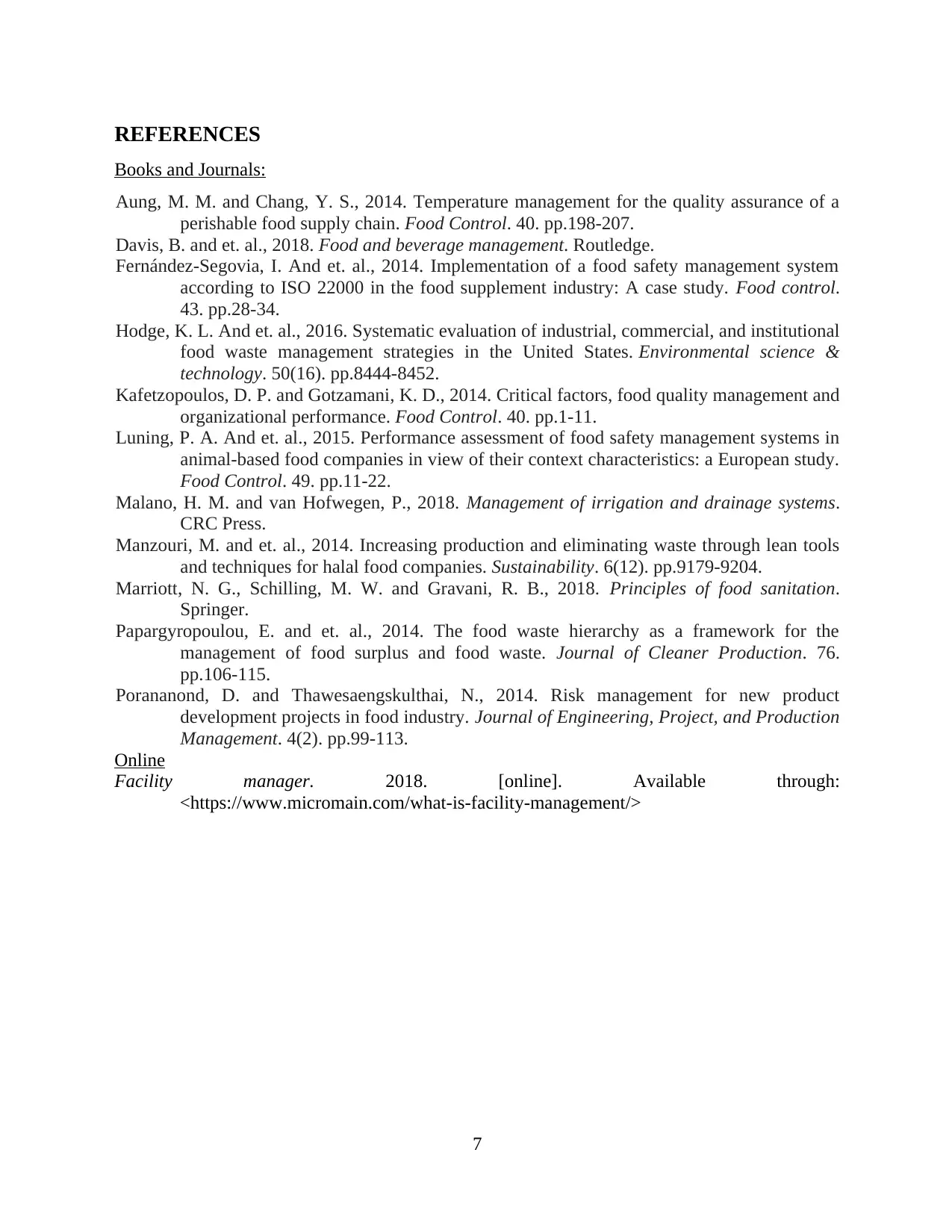
REFERENCES
Books and Journals:
Aung, M. M. and Chang, Y. S., 2014. Temperature management for the quality assurance of a
perishable food supply chain. Food Control. 40. pp.198-207.
Davis, B. and et. al., 2018. Food and beverage management. Routledge.
Fernández-Segovia, I. And et. al., 2014. Implementation of a food safety management system
according to ISO 22000 in the food supplement industry: A case study. Food control.
43. pp.28-34.
Hodge, K. L. And et. al., 2016. Systematic evaluation of industrial, commercial, and institutional
food waste management strategies in the United States. Environmental science &
technology. 50(16). pp.8444-8452.
Kafetzopoulos, D. P. and Gotzamani, K. D., 2014. Critical factors, food quality management and
organizational performance. Food Control. 40. pp.1-11.
Luning, P. A. And et. al., 2015. Performance assessment of food safety management systems in
animal-based food companies in view of their context characteristics: a European study.
Food Control. 49. pp.11-22.
Malano, H. M. and van Hofwegen, P., 2018. Management of irrigation and drainage systems.
CRC Press.
Manzouri, M. and et. al., 2014. Increasing production and eliminating waste through lean tools
and techniques for halal food companies. Sustainability. 6(12). pp.9179-9204.
Marriott, N. G., Schilling, M. W. and Gravani, R. B., 2018. Principles of food sanitation.
Springer.
Papargyropoulou, E. and et. al., 2014. The food waste hierarchy as a framework for the
management of food surplus and food waste. Journal of Cleaner Production. 76.
pp.106-115.
Porananond, D. and Thawesaengskulthai, N., 2014. Risk management for new product
development projects in food industry. Journal of Engineering, Project, and Production
Management. 4(2). pp.99-113.
Online
Facility manager. 2018. [online]. Available through:
<https://www.micromain.com/what-is-facility-management/>
7
Books and Journals:
Aung, M. M. and Chang, Y. S., 2014. Temperature management for the quality assurance of a
perishable food supply chain. Food Control. 40. pp.198-207.
Davis, B. and et. al., 2018. Food and beverage management. Routledge.
Fernández-Segovia, I. And et. al., 2014. Implementation of a food safety management system
according to ISO 22000 in the food supplement industry: A case study. Food control.
43. pp.28-34.
Hodge, K. L. And et. al., 2016. Systematic evaluation of industrial, commercial, and institutional
food waste management strategies in the United States. Environmental science &
technology. 50(16). pp.8444-8452.
Kafetzopoulos, D. P. and Gotzamani, K. D., 2014. Critical factors, food quality management and
organizational performance. Food Control. 40. pp.1-11.
Luning, P. A. And et. al., 2015. Performance assessment of food safety management systems in
animal-based food companies in view of their context characteristics: a European study.
Food Control. 49. pp.11-22.
Malano, H. M. and van Hofwegen, P., 2018. Management of irrigation and drainage systems.
CRC Press.
Manzouri, M. and et. al., 2014. Increasing production and eliminating waste through lean tools
and techniques for halal food companies. Sustainability. 6(12). pp.9179-9204.
Marriott, N. G., Schilling, M. W. and Gravani, R. B., 2018. Principles of food sanitation.
Springer.
Papargyropoulou, E. and et. al., 2014. The food waste hierarchy as a framework for the
management of food surplus and food waste. Journal of Cleaner Production. 76.
pp.106-115.
Porananond, D. and Thawesaengskulthai, N., 2014. Risk management for new product
development projects in food industry. Journal of Engineering, Project, and Production
Management. 4(2). pp.99-113.
Online
Facility manager. 2018. [online]. Available through:
<https://www.micromain.com/what-is-facility-management/>
7
⊘ This is a preview!⊘
Do you want full access?
Subscribe today to unlock all pages.

Trusted by 1+ million students worldwide
1 out of 9
Related Documents
Your All-in-One AI-Powered Toolkit for Academic Success.
+13062052269
info@desklib.com
Available 24*7 on WhatsApp / Email
![[object Object]](/_next/static/media/star-bottom.7253800d.svg)
Unlock your academic potential
Copyright © 2020–2026 A2Z Services. All Rights Reserved. Developed and managed by ZUCOL.





